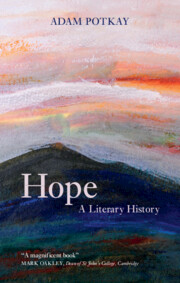Book contents
- Hope: A Literary History
- Hope
- Copyright page
- Contents
- Preface
- Introduction For and Against Hope
- 1 The Limits of Hope in the Ancient World
- 2 Eternal Hope: The Christian Vision
- 3 The Three Hopes of Humanism: Sacred, Profane, and Political
- 4 Something Evermore About to Be: Hope in the Romantic Era
- 5 Later Nineteenth-Century Responses to Romantic Hope
- 6 Modernism: Repetition, Epiphany, Waiting
- Notes
- Acknowledgments
- Index
4 - Something Evermore About to Be: Hope in the Romantic Era
Published online by Cambridge University Press: 27 January 2022
- Hope: A Literary History
- Hope
- Copyright page
- Contents
- Preface
- Introduction For and Against Hope
- 1 The Limits of Hope in the Ancient World
- 2 Eternal Hope: The Christian Vision
- 3 The Three Hopes of Humanism: Sacred, Profane, and Political
- 4 Something Evermore About to Be: Hope in the Romantic Era
- 5 Later Nineteenth-Century Responses to Romantic Hope
- 6 Modernism: Repetition, Epiphany, Waiting
- Notes
- Acknowledgments
- Index
Summary
Key Romantic authors sought to salvage hope and love as virtues separable from theology and without a clear basis in faith. We find in Wordsworth, Percy Shelley, and Goethe a post-theological insistence on the absolute value of hope and love as forms of imagination that free us from the constraints of experience. For Wordsworth, hope – political, social, though ultimately transcendent – is continuous with imagination, and thus also “intellectual” or spiritual love. Shelley repeatedly sought substitutes for faith within the Christian triad he would otherwise maintain: Queen Mab advances joy, hope, and love; “Hymn to Intellectual Beauty,” love, hope, and self-esteem. Shelley yokes the re-envisioned theological virtues to the service of an erotic vision of polity, without entirely surrendering hope in individual immortality or its possible secular equivalents. Goethe concludes his masterpiece Faust with a quasi-Dantean vision of Faustus’s redemption by his sublime hopes, intermixed with few if any good deeds and many bad ones, in a heaven without God or evil. Indeterminate hope does the work of faith in Goethe’s poem, just as moral hope does in the critical philosophy of Immanuel Kant.
- Type
- Chapter
- Information
- Hope: A Literary History , pp. 167 - 218Publisher: Cambridge University PressPrint publication year: 2022

